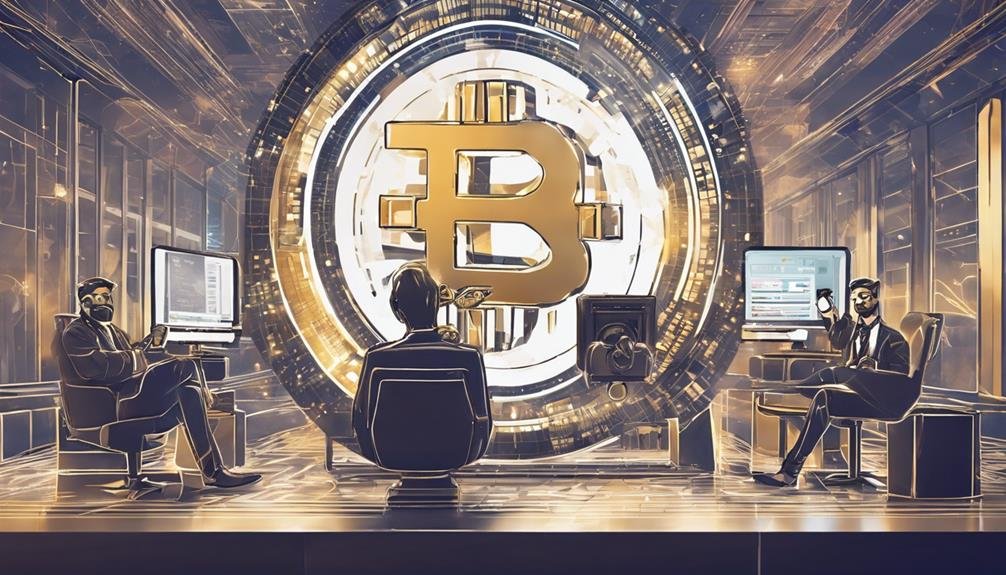DeFi circumvents traditional financial rules through its decentralized structure, enabling trustless transactions, peer-to-peer interactions, and smart contracts. The lack of central authority challenges conventional financial frameworks, offering users more control over assets and decisions.
DeFi’s transparency via blockchain technology attracts those seeking financial autonomy. Evading traditional banking constraints, DeFi operates globally with cross-border transactions, complicating regulatory oversight. Its rapid evolution outpaces regulatory adaptation, requiring flexible approaches for consumer protection. Collaborative regulatory efforts are essential for maintaining financial stability in a decentralized environment.
Understanding DeFi’s disruptive potential is crucial for navigating its regulatory challenges effectively.
Table of Contents
Brief Overview of How DeFi Evades Traditional Financial Rules?
- The lack of central authority in DeFi challenges traditional regulatory oversight.
- Smart contracts enable trustless transactions, bypassing traditional financial controls.
- Decentralized decision-making in DeFi complicates the enforcement of conventional rules.
- Regulatory arbitrage is utilized to exploit loopholes in traditional financial regulations.
- Global reach and cross-border transactions in DeFi evade localized regulatory constraints.
DeFis Decentralized Nature
DeFi’s decentralized nature revolutionizes traditional finance by enabling peer-to-peer transactions independent of conventional financial intermediaries. In DeFi, smart contracts play a pivotal role in automating processes, reducing the reliance on centralized control and oversight. These self-executing contracts streamline transactions and eliminate the need for intermediaries, fostering a more efficient and cost-effective financial ecosystem.
Decentralization in DeFi offers several advantages, including minimizing single points of failure, which enhances system resilience and security. By distributing control across a network of nodes rather than centralizing it, DeFi platforms become more robust and less vulnerable to cyber attacks or technical malfunctions. Additionally, the open-source nature of DeFi encourages innovation and rapid development within the financial sector, allowing for continuous improvements and new functionalities to meet evolving market demands.
However, this decentralized structure also challenges traditional financial regulatory approaches, as DeFi operates outside the control of centralized authorities, prompting a reevaluation of existing regulations to adapt to this innovative landscape.
Lack of Central Authority

Decentralized decision-making and trustless transactions are fundamental aspects of DeFi’s need for central authority. Users have more control over their financial activities without a central entity overseeing operations. This autonomy allows for direct peer-to-peer interactions, eliminating the need for intermediaries and introducing a new paradigm to traditional finance.
Decentralized Decision-Making
Operating outside the domain of centralized authorities, decentralized decision-making in finance presents a paradigm shift towards peer-to-peer interactions and autonomous control over financial activities. In DeFi, users can interact directly with one another, facilitated by smart contracts and blockchain technology.
This peer-to-peer model gives individuals autonomy over their funds and transactions, eliminating the need for traditional intermediaries. DeFi challenges the conventional governance structures and regulatory oversight in traditional finance by leveraging decentralized decision-making processes.
Through the innovative use of blockchain technology, individuals can engage in financial activities with increased transparency and efficiency, reshaping the landscape of financial transactions towards a more decentralized and autonomous framework.
Trustless Transactions
Trustless transactions in the domain of decentralized finance revolutionize the traditional financial landscape by eliminating the need for a central authority to oversee or validate transactions. Smart contracts play a pivotal role in enabling trustless transactions within DeFi platforms.
These contracts automatically execute transactions based on predefined rules, removing the need for intermediaries. DeFi guarantees transparent and secure transactions as users interact directly with the protocol. Decentralized governance models allow participants to vote on protocol changes democratically, ensuring transparency and autonomy.
This lack of central authority challenges the traditional financial system’s reliance on intermediaries, paving the way for a more efficient and autonomous financial ecosystem.
Peer-to-Peer Transactions

Peer-to-peer transactions in DeFi create direct trust relationships between users, bypassing the need for centralized intermediaries. These transactions rely on decentralized verification systems, ensuring that agreements are executed securely and transparently. DeFi empowers individuals to transact autonomously by disintermediating trust while maintaining control and privacy over their financial interactions.
Direct Trust Relationships
Utilizing blockchain technology and smart contracts, decentralized finance (DeFi) facilitates direct user interactions, establishing transparent and autonomous trust relationships for peer-to-peer transactions. By eliminating the need for intermediaries, DeFi enables users to engage directly with one another, mitigating counterparty risks through programmable agreements secured on the blockchain.
These direct trust relationships enhance transaction efficiency and contribute to the overall transparency and security of the DeFi ecosystem. Using smart contracts, users can execute transactions autonomously, ensuring that the agreement’s terms are met without relying on third parties. This shift towards direct peer-to-peer interactions challenges the traditional financial landscape by offering a decentralized alternative prioritizing trust and efficiency.
Decentralized Verification Systems
In decentralized finance (DeFi), implementing decentralized verification systems revolutionizes peer-to-peer transactions by eliminating the need for traditional financial intermediaries.
- Consensus mechanisms like Proof of Stake or Proof of Work validate peer-to-peer transactions in DeFi.
- DeFi’s decentralized verification systems enable trustless transactions, reducing reliance on centralized authorities.
- Smart contracts in DeFi execute transactions automatically based on predefined conditions, enhancing efficiency and transparency.
- DeFi’s peer-to-peer transactions are secured through cryptographic encryption, ensuring privacy and security for users.
Disintermediation of Trust
The evolution of decentralized verification systems within DeFi has fundamentally reshaped the landscape of peer-to-peer transactions by eliminating the reliance on traditional financial intermediaries. Through smart contracts and blockchain technology, users can engage in direct transactions, establishing trust through code rather than centralized institutions.
This disintermediation of trust streamlines the transaction process and enhances security and transparency. By providing a decentralized alternative to the conventional financial system, DeFi challenges established norms by offering individuals a more efficient and autonomous way to engage in economic interactions. Smart contracts play a pivotal role in automating processes traditionally managed by intermediaries, paving the way for a new era of decentralized finance.
Blockchain Technology Advantages

Blockchain technology’s inherent features provide numerous advantages for DeFi, including guaranteeing transparency, immutability, and decentralized security. These advantages make blockchain an ideal foundation for DeFi operations. Here are four key benefits:
- Transparency: Blockchain technology enables all transactions to be recorded on a public ledger, visible to all participants. This transparency enhances trust and accountability in DeFi systems.
- Immutability: Once data is recorded on a blockchain, it cannot be altered or deleted. This feature guarantees the integrity and permanence of financial transactions, reducing the risk of fraud.
- Decentralization: By distributing data across a network of nodes, blockchain eliminates the need for a central authority, reducing the risk of manipulation or system failures in financial transactions.
- Smart Contracts: These self-executing contracts automatically enforce and execute the terms of an agreement when predefined conditions are met. Smart contracts on blockchain streamline processes, reduce costs, and eliminate the need for intermediaries in DeFi transactions.
Bypassing Traditional Regulatory Hurdles

DeFi’s ability to bypass traditional regulatory hurdles stems from its utilization of regulatory arbitrage strategies and decentralized governance structures. By leveraging these methods, DeFi platforms can navigate existing financial regulations and operate outside traditional oversight. This approach allows for innovative solutions that challenge the conventional financial landscape and pave the way for a new era of decentralized finance.
Regulatory Arbitrage Strategies
Utilizing decentralized platforms, innovative financial entities in the DeFi space strategically navigate regulatory frameworks to create new opportunities through regulatory arbitrage strategies.
- By exploiting regulatory arbitrage, DeFi projects bypass traditional financial rules.
- Decentralized platforms offer a loophole for DeFi entities to sidestep regulatory constraints.
- DeFi leverages the flexibility of decentralized governance to circumvent traditional regulatory hurdles.
- Regulatory arbitrage in DeFi fosters the development of novel financial products outside conventional oversight, highlighting the evolving landscape of financial regulation.
Decentralized Governance Structures
Decentralized governance structures in the DeFi space present a paradigm shift in regulatory oversight, enabling community-led decision-making processes that challenge traditional financial rules. Within decentralized finance, blockchain technology and smart contracts facilitate autonomous transactions, circumventing the need for intermediaries and disrupting conventional regulatory frameworks.
The advent of DAOs further complicates regulatory challenges by operating without centralized control, making it arduous for regulators to monitor decision-making mechanisms. DeFi protocols, needing a central authority, impede regulatory enforcement of traditional financial compliance measures.
The global participation allowed by DeFi’s decentralized nature poses a significant challenge to traditional financial institutions and regulators, highlighting the need for innovative regulatory approaches to govern this rapidly evolving landscape.
More Control Over Assets

Users in the DeFi space enjoy unprecedented control over their assets, setting a new standard for financial autonomy. This level of control is a stark departure from traditional finance systems, where centralized entities typically dictate asset management. In DeFi, individuals have the power to manage their assets directly through decentralized platforms, enabling a more hands-on approach to financial decisions. Here are four key ways in which DeFi offers more control over assets:
- Direct Asset Management: Users can access, transfer, and invest their assets in DeFi without intermediaries, allowing greater control over their financial holdings.
- Autonomy in Decision-Making: Unlike traditional finance, DeFi empowers individuals to make decisions regarding their assets independently, without external influence.
- Elimination of Restrictions: DeFi eliminates many of the restrictions imposed by centralized financial institutions, giving users more flexibility and freedom in managing their assets.
- Enhanced Transparency: DeFi’s decentralized nature provides greater transparency, allowing users to monitor and track their assets with clarity and openness.
Transparency and Accessibility

The transparency provided by DeFi‘s public blockchain transactions enhances accessibility for a wide range of users seeking to engage in financial activities without traditional barriers. DeFi platforms offer transparency through public blockchain technology that conventional financial systems often lack.
Users can trace and verify all transactions, ensuring a pivotal level of trust and security. This transparency fosters trust and opens up economic opportunities to a broader audience.
Accessibility in DeFi is a key factor that differentiates it from traditional finance. Anyone with an internet connection and a crypto wallet can participate in DeFi activities, eliminating the need for intermediaries and complex approval processes. Smart contracts are essential in ensuring that transactions are automated and secure, further enhancing accessibility.
Real-time data on interest rates, asset values, and transaction histories provided by DeFi platforms contribute to financial inclusion by empowering users with information to make informed decisions. The decentralized nature of DeFi allows individuals worldwide to access financial services without facing restrictions or discrimination, promoting a more inclusive financial ecosystem.
Attraction to Users Seeking Freedom

For individuals seeking financial autonomy and flexibility, DeFi presents a compelling opportunity to engage in borderless transactions without traditional intermediaries. The allure of DeFi lies in its decentralized nature and the freedom it offers to users in the finance domain. Here are four key reasons why DeFi attracts users looking to break free from traditional financial constraints:
- Full Control: DeFi platforms empower users with complete control over their funds, enabling them to make financial decisions without centralized oversight.
- Global Transactions: DeFi protocols allow users to transact globally with minimal restrictions, providing access to various financial services regardless of geographical boundaries.
- Innovative Services: The decentralized nature of DeFi opens up opportunities for users to explore cutting-edge financial products and services that may not be available within traditional finance systems.
- Autonomy and Efficiency: DeFi caters to individuals seeking autonomy, flexibility, and efficiency in their financial transactions, offering a platform where they can operate outside the confines of traditional financial rules.
Evading Traditional Banking Constraints

DeFi’s departure from traditional banking constraints is evident in its utilization of blockchain technology and smart contracts to offer decentralized financial services. DeFi platforms enable peer-to-peer transactions by operating on decentralized networks, eliminating the need for intermediaries such as banks.
This approach allows users to access financial services without the restrictions imposed by centralized institutions. Through open-source protocols and permissionless access, DeFi platforms facilitate a more inclusive financial ecosystem not bound by traditional banking regulations.
Smart contracts play an important role in evading traditional banking constraints within DeFi. These automated contracts enable users to engage in various financial activities like lending, borrowing, and trading without the oversight of conventional financial entities.
The programmable nature of DeFi not only automates processes but also fosters innovation in financial products and services, challenging the regulatory frameworks of traditional finance. In this way, DeFi continues to push the boundaries of conventional banking constraints through its decentralized and technologically advanced approach.
DeFis Regulatory Challenges

DeFi poses intricate regulatory challenges for traditional financial oversight bodies operating in a decentralized landscape. DeFi’s decentralized nature challenges traditional financial regulations as it operates outside centralized control. The complexity arises from using blockchain and smart contracts, which do not neatly fit into existing regulatory frameworks.
Regulators need to work on monitoring and enforcing compliance within DeFi platforms that offer financial services without traditional intermediaries. DeFi’s global reach and cross-border transactions also present additional hurdles for regulators working to establish consistent oversight. The rapid pace of innovation and evolution in DeFi outpaces regulatory adaptation, creating a dynamic regulatory environment for decentralized finance.
As DeFi continues to expand, regulatory bodies must grapple with the unique challenges this decentralized ecosystem poses to secure financial stability and consumer protection.
Frequently Asked Questions
How Does Defi Affect Traditional Finance?
DeFi’s impact on traditional finance includes regulatory challenges, market disruption, risk management shifts, innovation potential, and enhanced financial inclusion. Its decentralized nature challenges existing norms, prompting adaptation and reevaluation of traditional economic practices.
What Is the Difference Between Traditional Finance and Decentralized Finance?
Traditional finance refers to the established financial systems and institutions that have been in place for decades, such as banks, stock markets, and central authorities like governments and regulatory bodies. These systems are centralized, meaning they are controlled by a central authority and transactions are processed through intermediaries.
On the other hand, decentralized finance (DeFi) is a new paradigm that leverages blockchain technology to create a financial system that is open, permissionless, and operates without the need for intermediaries. DeFi applications are built on public blockchain networks, allowing users to transact directly with each other using smart contracts. This eliminates the need for traditional financial intermediaries like banks, brokers, and clearinghouses.
Key differences between traditional finance and decentralized finance include:
- Control and ownership: In traditional finance, financial institutions have control over users’ funds and transactions. In DeFi, users have full control and ownership of their assets at all times.
- Accessibility: Traditional finance systems often have barriers to entry, such as minimum account balances and geographical limitations. DeFi is accessible to anyone with an internet connection, enabling global participation.
- Transparency: DeFi transactions are recorded on a public blockchain, providing full transparency and auditability. Traditional finance transactions are usually not as transparent.
- Intermediaries: Traditional finance relies on intermediaries to facilitate transactions and enforce regulations. DeFi eliminates the need for intermediaries through the use of smart contracts.
- Innovation: DeFi is known for its rapid pace of innovation, with new protocols and applications being developed continuously. Traditional finance is slower to adapt to new technologies and trends.
Overall, while traditional finance is well-established and regulated, decentralized finance offers a more open, transparent, and inclusive alternative that has the potential to reshape the future of finance.
What Are the Five Flaws of Traditional Finance?
The five flaws of traditional finance are often identified as:
- Market Inefficiency: Traditional finance assumes that markets are efficient and always reflect all available information. However, in reality, markets can be inefficient due to factors such as behavioral biases and information asymmetry.
- Risk and Return Trade-off: Traditional finance typically assumes a linear relationship between risk and return, where higher returns are only achievable by taking on higher risks. This oversimplification can lead to suboptimal investment decisions.
- Neglect of Behavioral Finance: Traditional finance often overlooks the psychological and emotional aspects of decision-making, assuming that investors always act rationally. In reality, human behavior can be influenced by biases and emotions, leading to irrational financial decisions.
- Short-Term Focus: Traditional finance tends to prioritize short-term gains over long-term value creation. This focus on short-term performance can lead to excessive risk-taking and neglect of sustainable growth strategies.
- Lack of Inclusivity: Traditional finance has been criticized for its lack of inclusivity and accessibility, with many financial products and services catering primarily to wealthier individuals. This exclusion can perpetuate wealth inequality and limit opportunities for broader participation in the financial system.
Why Defi Is Better Than Tradfi?
Decentralized finance (DeFi) is often seen as better than traditional finance (TradFi) for several reasons:
- Accessibility: DeFi platforms are open to anyone with an internet connection and a digital wallet, allowing for greater financial inclusion compared to traditional financial services that may have barriers to entry.
- Transparency: DeFi operates on blockchain technology, which provides a transparent and immutable ledger of transactions. This transparency can help build trust among users and reduce the risk of fraud and manipulation.
- Security: DeFi platforms are decentralized and do not rely on a central authority, making them less vulnerable to hacking and other security breaches. Users have more control over their funds and assets in DeFi compared to traditional finance.
- Lower costs: DeFi platforms often have lower fees and costs compared to traditional financial services, which can be more expensive due to overhead costs associated with physical infrastructure and intermediaries.
- Innovation: DeFi allows for programmable and automated financial services through smart contracts, enabling new and innovative products and services that may not be possible in traditional finance.
Overall, DeFi offers a more inclusive, transparent, secure, and cost-effective alternative to traditional finance, making it an attractive option for many individuals and businesses. However, it is important to note that DeFi is still a relatively new and evolving sector with its own risks and challenges.
Conclusion
In the intricate tapestry of financial systems, DeFi emerges as an agile acrobat, gracefully slipping past the rigid barriers of traditional regulations. Its decentralized nature, blockchain technology, and peer-to-peer transactions enable it to navigate uncharted waters easily.
Despite facing regulatory challenges, DeFi’s transparency and accessibility continue to attract users seeking financial freedom. Like a skilled tightrope walker, DeFi balances the fine line between innovation and regulation, paving the way for a new era of financial possibilities.




